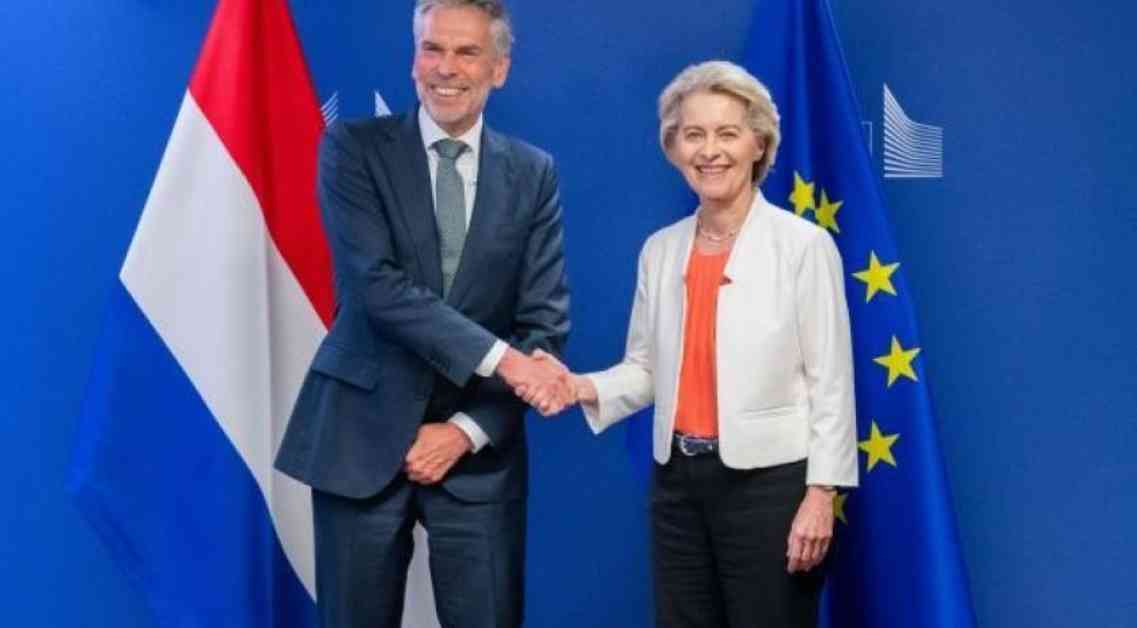Compromis: PM Schoof hoeft Nederlandse steun niet in te trekken van EU bewapeningsplan
Op vrijdag 14 maart 2025 om 09:02 uur kwam naar buiten dat de Nederlandse premier Dick Schoof voorlopig zijn steun aan het 800 miljard euro defensieplan van de Europese Commissie niet hoeft in te trekken. Dit compromis werd bereikt na crisisoverleg met de leiders van de coalitiepartijen die zijn kabinet vormen. Schoof zal standvastig moeten blijven in Brussel om ervoor te zorgen dat budgettaire regels niet buitensporig worden versoepeld, aldus bronnen na de gesprekken op donderdagavond.
De Europese lidstaten mogen zichzelf niet in een nieuwe schuldencrisis storten, zo werd afgesproken als onderdeel van een breed kader tijdens de gesprekken die ’s ochtends begonnen en later op de avond werden voortgezet. Alleen VVD-leider Dilan Yesilgoz ontbrak, omdat ze in Kiev was voor een ontmoeting met de Oekraïense president Volodymyr Zelenskyy.
De Europese Commissie wil dat de lidstaten de komende vier jaar fors investeren in het ReArm Europe-plan van de Europese president Ursula von der Leyen, nu de bescherming van de grootste bondgenoot van de NAVO, de Verenigde Staten, minder zeker is geworden. Om dit mogelijk te maken, wil het uitvoerend orgaan van de EU gezamenlijke leningen van 150 miljard euro verstrekken in de vorm van Eurobonds. Ook wil het extra defensie-uitgaven uitsluiten van de begrotingsovereenkomsten.
Schoof sprak zijn steun uit voor dit voorstel tijdens de EU-top van vorige week, hoewel hij wist dat de coalitiepartijen PVV, NS en BBB er moeite mee hadden. Deze drie partijen steunden deze week een motie van JA21, waardoor een meerderheid van 73-71 van parlementariërs tegen de steun van het kabinet voor het Europese bewapeningsplan stemde.
Dit maakte Schoof boos, omdat hij zich beperkt voelde in zijn manoeuvreerruimte in Brussel, en hun breuk met Schoof frustreerde ook coalitiepartner VVD. Die partij’s voormalige leider, Mark Rutte, staat momenteel aan het hoofd van de NAVO na bijna 15 jaar als premier van Nederland te hebben gediend.
Op donderdagavond werd duidelijk dat er een oplossing was gevonden voor de recente interne verdeeldheid binnen de coalitie. In tegenstelling tot wat PVV-leider Geert Wilders eerder deze week zei, hoeft Schoof zijn steun aan de plannen niet in te trekken.
Schoof moest wel enkele toezeggingen doen, waaronder de belofte dat hij niet akkoord zou gaan met nog hogere schuldniveaus zonder de goedkeuring van de Tweede Kamer, de Tweede Kamer van het Parlement. Lidstaten moeten ook verantwoordelijk blijven voor het terugbetalen van hun eigen schulden, aldus bronnen.
Meer van dit

